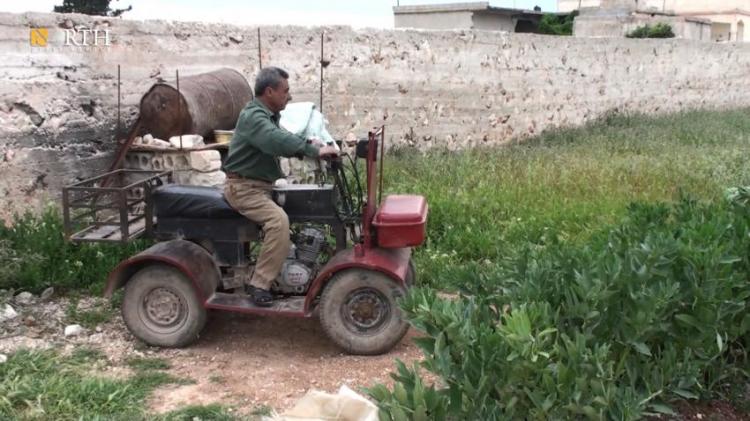Disabled IDP from Afrin struggles to find source of income
Aleppo northern countryside – North-Press Agency
Dijla Khalil
It has been more than a month and a half since Bashir Ali, an IDP from the city of Afrin, stopped working in the bazaars of the villages of the northern countryside of Aleppo, as the curfew imposed by the Autonomous Administration to prevent coronavirus forced him to stay home.
Bashir, who suffers from the inability to move his lower limbs as a result of polio, was working at a small stall after his displacement from Afrin to the northern countryside of Aleppo in 2018, after the Turkish army and its opposition groups took control of the region. This stall has become his only source of livelihood here.
Like most of the workers in the markets, his work is stopped now. “Before the imposition of the curfew, I could almost manage, but the risks of the coronavirus outbreak ceased my work, so my living conditions have deteriorated," he said.
Sole breadwinner
Bashir has 4 daughters, all of whom were going to school before the curfew. "I insist on completing the education of my daughters, especially since I could not go to school because of my polio and financial conditions," he said.
The father suffers from difficult financial conditions, as he is the sole breadwinner in the family. In addition to this, his health condition prevents him from expanding his job or taking other jobs. "I used to sell my goods in two close bazaars, as I could not go for long distances due to my physical situation, and I could not expand my stall because I was unable to carry it and move it alone."
With his work stopped, he spent the money he saved, but the extension of the curfew period three times left him with nothing to spend on his family. "Despite my simple work and my limited income, I was able to manage my daily livelihood. But now, and since the prevention of gatherings and closure of the markets about a month and a half ago, the living conditions of my family have become difficult,” he remarked.
Living expenses as an obstacle
Bashir hopes the pandemic will end in order to be able to resume his job and make a living, because after he left his house and his small shop in the popular market in Afrin’s city center, he does not have any other livelihood.
But the easing of the market closures, he faces a problem in returning to work because of the high prices of the goods he was selling, and because he spent all his savings due to high food and vegetable prices.
Like other parts of the country, the villages and towns of the northern countryside of Aleppo witnessed an increase in prices, and the value of the Syrian Pound has deteriorated against the dollar during the curfew, which led to additional suffering for low-income people.
Heartbreak
Bashir recalls his days in Afrin and how he used to spend time with his neighbors, as he said, heartbroken: "We did not feel how time passed, because all the sellers and shop owners in the popular market were like one family. We used to share conversations while drinking tea in front of our stores."
"Now I move with my stall among the villages' bazaars and I don't know any of the sellers. The owner of the stall next to me changes every time. I long for the days I spent in Afrin." Bashir added after a few seconds' silence.
On March 16th, Bashir left Afrin with his family, going to al-Ahlam mountain in Sherawa district south of Afrin and heading to the northern countryside of Aleppo, leaving behind what he had owned, describing the moments of his displacement from Afrin as "hard and critical.”
"I left Afrin by my motorcycle, while my wife and children walked out. The road was long; at that moment, I felt weak because I could not offer anything to them, it was a difficult night I spent in the open, it was raining and my family members were tired and cold,” he said.
He said that his motorcycle was not big enough for his family members. Because the road was difficult, he had to take one of his daughters with him on his motorcycle to put her in a specific place, then return to pick up another one, “so we could reach the northern countryside of Aleppo."
Bombing
Bashir used to own a small store in the popular market in the middle of Afrin, which he relied on as a source for his family's livelihood before Turkish forces and their armed opposition groups took control of the city more than two years ago and seized the properties of the residents, especially the displaced.
Like now, he used to sell accessories, socks, and combs in his store in the popular market in Afrin, "I chose this job because it matches my physical abilities, because such kind of goods are lightweight, and it doesn't require much effort to arrange and transport them."
One day, Bashir was hoping to return to his store in the popular market in Afrin, but the bombing that his city witnessed a few days ago destroyed his store and "nothing remains", he said.
Bashir sees that his affairs and conditions will not improve until he returns to Afrin. He has written the name of his city and the date he left it on the wall of his house in the village of Tel Sosan in the northern countryside of Aleppo, "I wrote the date of my exit from Afrin on the wall of the house, and added the name Afrin, because that day was tragic and the beginning of a new suffering in addition to what I have already suffered.”

